Conversion of Jews
In 576, an event occurred between him and the Jewish community in Clermont that was recorded by his contemporary Gregory of Tours. According to Gregory, Avitus had been praying and calling on the Jews in Clermont to convert to Christ. One of the Jews listened to the bishop and accepted baptism on Easter. This convert also joined in the Easter procession through the city. One of the other Jews then poured stinking oil on this convert's head from above while he was in the procession. The Christians wanted to stone this Jew to death, however, Avitus forbade them.
Later on the Feast of the Ascension, when Avitus was having another procession through the city, a mob of Christians attacked the Jewish synagogue in Clermont and burned it to the ground. Later, the bishop sent a messenger to the Jews in Clermont, which (according to Gregory's account) said: "I do not compel you by force to confess the Son of God, but nevertheless I preach him and I offer to your hearts the salt of wisdom. I am the shepherd put in charge of the Lord's sheep, and as regards you, the true Shepherd who suffered for us said that he had other sheep which are not in his sheepfold but which should be brought in, so that there may be one flock and one shepherd. And therefore if you are willing to believe as I, be one flock with me as your guardian; but if not, depart from the place".
Three days after this message was given, according to Gregory, 500 Jews accepted baptism rather than being forcibly expelled from the city. [3]

Easter, also called Pascha or Resurrection Sunday, is a Christian festival and cultural holiday commemorating the resurrection of Jesus from the dead, described in the New Testament as having occurred on the third day of his burial following his crucifixion by the Romans at Calvary c. 30 AD. It is the culmination of the Passion of Jesus, preceded by Lent, a 40-day period of fasting, prayer, and penance.

Polycarp was a Christian bishop of Smyrna. According to the Martyrdom of Polycarp, he died a martyr, bound and burned at the stake, then stabbed when the fire failed to consume his body. Polycarp is regarded as a saint and Church Father in the Eastern Orthodox Church, Roman Catholic Church, Oriental Orthodox Churches, Lutheranism, and Anglicanism.
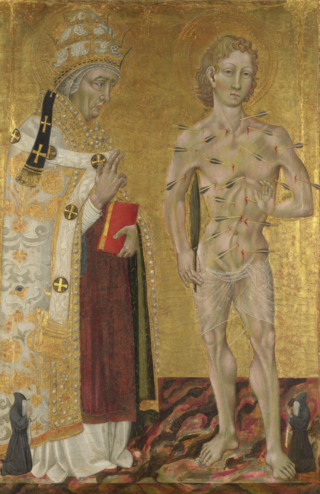
Pope Fabian was the bishop of Rome from 10 January 236 until his death on 20 January 250, succeeding Anterus. A dove is said to have descended on his head to mark him as the Holy Spirit's unexpected choice to become the next pope. He was succeeded by Cornelius.
The liturgical year, also called the church year, Christian year, ecclesiastical calendar, or kalendar, consists of the cycle of liturgical days and seasons that determines when feast days, including celebrations of saints, are to be observed, and which portions of scripture are to be read.

Pope Adeodatus I, also called Deodatus I or Deusdedit, was the bishop of Rome from 19 October 615 to his death. He was the first priest to be elected pope since John II in 533. The first use of lead seals or bullae on papal documents is attributed to him. His feast day is 8 November.
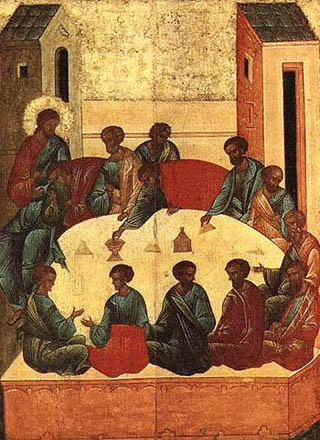
Maundy Thursday or Holy Thursday, among other names, is the day during Holy Week that commemorates the Washing of the Feet (Maundy) and Last Supper of Jesus Christ with the Apostles, as described in the canonical gospels.

Holy Week includes the events of Jesus Christ's entry into Jerusalem, the last supper, the arrest, and his death by crucifixion. For all Christian traditions, it is a moveable observance. In Eastern Christianity, which also calls it Great Week, it is the week following Great Lent and Lazarus Saturday, starting on the evening of Palm Sunday and concluding on the evening of Great Saturday. In Western Christianity, Holy Week is the sixth and last week of Lent, beginning with Palm Sunday and concluding on Holy Saturday.

Alcimus EcdiciusAvitus was a Latin poet and bishop of Vienne in Gaul. His fame rests in part on his poetry, but also on the role he played as secretary for the Burgundian kings.

Holy Saturday, also known as Great and Holy Saturday, Low Saturday, the Great Sabbath, Hallelujah Saturday, Saturday of the Glory, Sábado de Gloria, and Black Saturday or Easter Eve, and called "Joyous Saturday", "the Saturday of Light", and "Mega Sabbatun" among Coptic Christians, is the final day of Holy Week, between Good Friday and Easter Sunday, when Christians prepare for the latter.
The purpose of this timeline is to give a detailed account of Christianity from the beginning of the current era (AD) to the present. Question marks ('?') on dates indicate approximate dates.
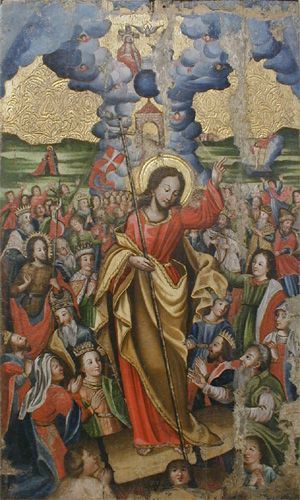
Eastertide or Paschaltide is a festal season in the liturgical year of Christianity that focuses on celebrating the Resurrection of Jesus Christ. Preceded by Lent, it begins on Easter Sunday, which initiates Easter Week in Western Christianity, and Bright Week in Eastern Christianity.
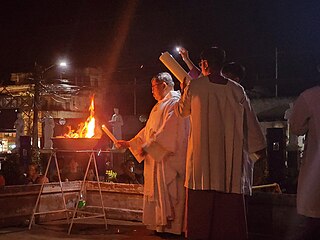
The Easter Vigil, also called the Paschal Vigil, the Great Vigil of Easter, or Holy Saturday at the Easter Vigil on the Holy Night of Easter is a liturgy held in traditional Christian churches as the first official celebration of the Resurrection of Jesus. Historically, it is during this liturgy that people are baptized and that adult catechumens are received into full communion with the Church. It is held in the hours of darkness between sunset on Holy Saturday and sunrise on Easter Day – most commonly in the evening of Holy Saturday or midnight – and is the first celebration of Easter, days traditionally being considered to begin at sunset.

A procession is an organized body of people walking in a formal or ceremonial manner.
Saint Ferréol (Ferreolus) of Uzès was bishop of Uzès and possibly bishop of Nîmes (553-581). His Feast Day is January 4.
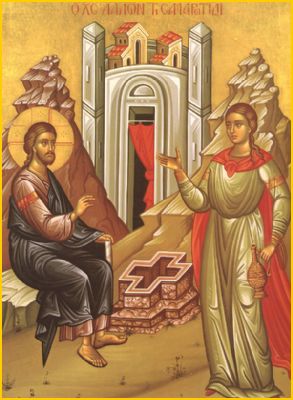
The Pentecostarion is the liturgical book used by the Eastern Orthodox and Byzantine Catholic churches during the Paschal Season which extends from Pascha (Easter) to the Sunday following All Saints Sunday.

Saint-Avit-Sénieur is a commune in the Dordogne department in Nouvelle-Aquitaine in southwestern France.

August 20 - Eastern Orthodox liturgical calendar - August 22

December 18 - Eastern Orthodox liturgical calendar - December 20

Similien, or Similianus, was a 4th-century, French Bishop and Saint.
Saint Hesychius or Isicius was a bishop of Vienne in the Dauphiné, France. He is venerated as a saint by the Catholic Church.














